
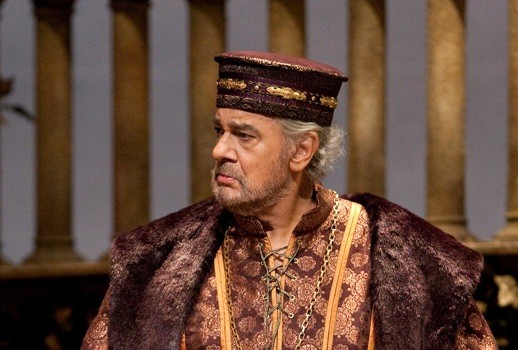
Over the past decade Domingo’s embrace of some of opera’s greatest baritone roles has been controversial to say the least, while Levine’s debilitating health issues have caused havoc with his duties at the Met as both conductor and music director. Boccanegra proved an honorable, occasionally marvelous yet grossly flawed stab at one of Verdi’s most penetrating explorations of paternal love.
Bumpy Levine-led performances in the fall of both Tannhäuser and Die Fledermaus vexed many, and his shocking withdrawal from the new production of Lulu caused real alarm about his abilities. Eventually rumors began swirling that the Met was planning to announce that he would step down as music director at the end of next season. Then an astonishing piece by Michael Cooper appeared in The New York Times which revealed intimate details about the conductor’s new treatment regimen and possible improved prognosis. Word was that Peter Gelb would be closely monitoring the Boccanegra rehearsals for signs of improvement… or decline.
Apparently matters proceeded without incident as a beaming Levine rose Friday to acknowledge the audience with his current mixture of beaming smiles and elfin waves. The orchestra immediately proved itself in fine form, particularly the lower strings, which reveled in the evocative prelude to Boccanegra’s prologue.
His sweeping gestures displayed none of the flailing about that had surfaced in Tannhäuser. Apparently Levine had his hands full with the orchestra as he sometimes ignored what was transpiring on stage. More than once singers ran into trouble and got little help from the maestro, and the thrilling choral explosion in the Council Chamber scene nearly ran off the rails.
Although lately it’s been difficult to staunch one’s anxiety during a Levine performance, Boccanegra was equivocally reassuring as he struck me as more in command than he had been earlier in the season. And yet the parlous state of the musical leadership at the Met remains: perhaps Levine will continue to improve and fulfill his conducting commitments, but why must he also remain music director? I have heard from more than one party that the orchestra, while remaining a very fine ensemble, has been steadily slipping from its earlier exalted status due to Levine’s frequent absences and impaired state.
Surely no one, except perhaps Levine himself, would perceive a transition to emeritus status as a demotion. Someone new could then take a close look at what the Met needs now—for the first time in decades and decades it would be getting a fresh perspective.
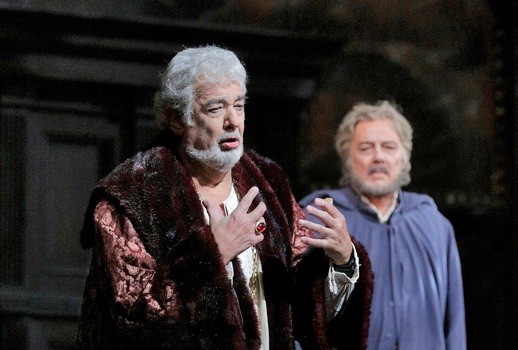
Perhaps one might forgive his rhythmically inept, stylistically-at-sea Neptune in the disastrous The Enchanted Island, but his remote, underpowered Don Carlo in last season’s Ernani was a shocking flop—no wonder he canceled the Saturday broadcast. I missed his Germont which some suggested worked well, but I did catch his 2010 Boccanegra which was touching particularly in comparison to Dmitri Hvorostovsky’s chilly, self-regarding doge the following season.
Yet that earlier Boccanegra sounded all wrong—an aging still vibrant tenor bobbing and weaving his way through one of Verdi’s greatest baritone roles. My ear, conditioned by Piero Cappuccilli’s live and commercial recordings, just couldn’t get used to Domingo’s sound. Friday’s performance was even more alarming as his singing has hardened and become increasingly short-breathed, his stage persona more distracted.
While his dark tenor retains an enviable steadiness and he can occasionally still pump out a good deal of volume, it can’t provide the richness and amplitude one wants for the role, particularly in the lyrical reunion duet with Amelia which fell flat, although he managed a respectable floating “Figlia!” at its conclusion. Verdi deserves better—a real baritone not a 75-year-old superstar tenor struggling through music he shouldn’t be singing in the first place.
Eight years Domingo’s junior, bass Ferruccio Furlanetto returned in one of his most acclaimed roles. His was a particularly fierce and unforgiving Fiesco though he brought a surprisingly poignant concern for the dying Boccanegra to the final scene. The last time I heard him was three years ago as Philip II in the appalling Lorin Maazel-led Don Carlo where he sounded labored and unsteady and perhaps ready to consider retirement. On Friday he took some time to warm up so his gravelly “Il lacerato spirito” began poorly, but by his heavenly benediction of Gabriele in the first act, he sounded like his old self.
After his illness-plagued run of Lucia last season, Joseph Calleja reappeared in fine form as Adorno, his idiosyncratic tenor ringing out excitingly. Although his unusually quick and prominent vibrato drives some people crazy, I’ve always been fond of it although it seems a bit less pronounced these days as the voice grows bigger. Although he remains an earnest, if clumsy actor, he handled Adorno’s demanding second-act scena with ease.
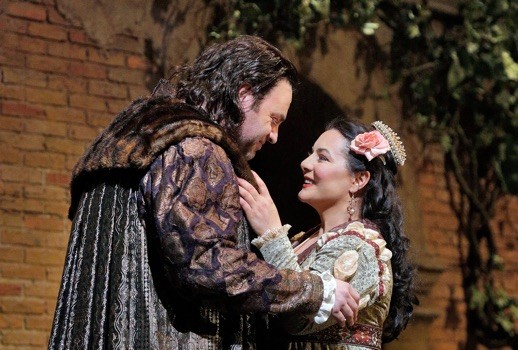
Lianna Haroutounian made her Met debut last season in a one-night-stand as Elisabetta in Don Carlo but as Amelia Grimaldi gets the entire run this time. An indifferent, placid actress, she brought a sizable enthusiastic soprano to her grateful music. After Levine’s delicate prelude, her “Come in quest’ora bruna” lumbered along without taking flight. It became increasingly clear that the middle of the voice was not her glory and the most she could manage lower down was a bit of “baby” chest. Calleja’s entrance loosened her up and they partnered excitingly in Amelia and Gabriele’s highly-charged duet.
Soon Haroutounian revealed her strength—big soaring high notes which dominated Council Chamber Scene and the superb trio that concludes the second act. After Adrianne Pieczonka and Barbara Frittoli’s more modestly-scaled recent Amelias, I had to go back to Anna Tomowa-Sintow in my first Boccanegra to recall another soprano who so ably sailed over the chorus and orchestra. One must however note that her quiver of talents lacks a trill, so the enchanting ornaments that crown the big Act I ensemble were barely indicated.
For some reason baritone Brian Mulligan has performed only infrequently at the Met: less than a dozen times over the past dozen years. But his boldly trenchant Paolo immediately seized one’s attention while his cowering whispered “Sia maledetto” brought the amazing first act finale to a chilling conclusion. He was ably partnered by Richard Bernstein, whose expert Pietro has been a valued feature of the previous three revivals of Boccanegra.
Eric Einhorn dutifully revived Giancarlo Del Monaco’s staid 20 year old production but failed to whip up much energy or chemistry between his cast members. Domingo’s flamboyant mortal fall brought appreciative gasps but it played like a stunt that distracted from Boccanegra’s poignant, quiet death. Michael Scott’s splendidly luxurious costumes and sumptuously old-fashioned sets still dazzle, particularly the Veronese-influenced Council Chamber scene, but the sets require numbingly long scene changes which defuse the opera’s momentum.
While it’s likely Boccanegra wouldn’t have been revived without Domingo, his maddeningly compromised portrayal resulted in more frustration than satisfaction. Yet it would be foolish to miss a frequently satisfying opportunity to experience this extraordinary opera, however frustrating the lacuna at its center.















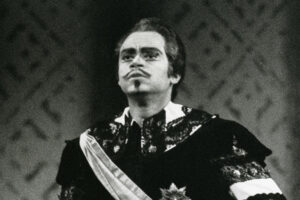
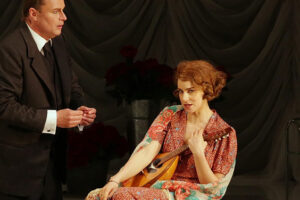
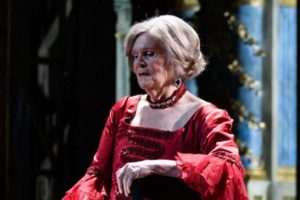






Comments